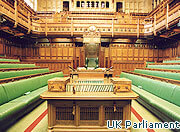A clear definition of “extremist behaviour” must be included in upcoming legislation, an influential group of MPs has said.
The Home Affairs Committee warned that a “full explanation of what the Government is and is not seeking to achieve” must be given.
Critics of the Government plans, including The Christian Institute, have warned that current definitions of extremism are too broad and may catch people who simply have strong views.
Free speech
The Committee noted that finding a suitable definition has been “problematic” for the Home Office, amid concerns about freedom of speech being curtailed.
It urged the Government to “do more to explain its approach to any new measures aimed at countering extremism”.
The Committee, made up of Conservative, Labour and SNP MPs, reflected concerns from senior police officers about the proposals.
Backfire
In May, Chief Constable Simon Cole, the police lead for the Government’s Prevent programme, said plans to counter extremism could lead to ‘thought policing’.
The former Chief Constable of Greater Manchester Police and lead for the Government on counter-terrorism, Sir Peter Fahy, has also issued a caution.
He said last year: “There is a concern that efforts to control extremist narratives will limit free speech and backfire if we don’t get the balance right.”
And a former head of MI5 has stated that “harmless evangelical street preachers” could be subjected to crackdowns from the Government’s anti-extremism drive.
Prohibit
Earlier in the summer, the Joint Committee on Human Rights said that religious conservatives could be indiscriminately penalised by the Government’s counter-extremism laws.
… full explanation of what the Government is and is not seeking to achieve
Home Affairs Committee
The Committee, comprised of cross-party MPs and Peers, found that the Government had not offered “coherent or sufficiently precise” key definitions.
Without a clear definition, it added, authorities would have “wide discretion to prohibit loosely defined speech which they find unacceptable”.
Evangelical Christians, Orthodox Jews and others who have conservative religious views and do not encourage violence could all be penalised, the Committee said.
Chilling effect
Current laws, it said, provided an “extensive legal framework for dealing with people who promote violence” and so far the Government “has not been able to demonstrate that a significant gap in this framework exists”.
The Defend Free Speech campaign, supported by The Christian Institute, the National Secular Society and the Peter Tatchell Foundation, has consistently warned of the threat to free speech from the Government’s plans.
The Christian Institute’s Simon Calvert, Campaign Director of Defend Free Speech, said in 2015: “We are deeply concerned with the Government’s plans. The complete absence of safeguards and any clear definition of what is deemed to be extreme will have a chilling effect on free speech and campaigners.”

